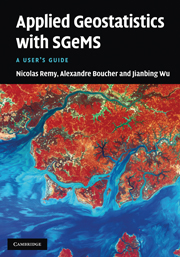Book contents
- Frontmatter
- Contents
- Foreword by Albert Tarantola
- Preface
- List of programs
- List of symbols
- 1 Introduction
- 2 General overview
- 3 Geostatistics: a recall of concepts
- 4 Data sets and SGeMS EDA tools
- 5 Variogram computation and modeling
- 6 Common parameter input interfaces
- 7 Estimation algorithms
- 8 Stochastic simulation algorithms
- 9 Utilities
- 10 Scripting, commands and plug-ins
- Bibliography
- Index
8 - Stochastic simulation algorithms
Published online by Cambridge University Press: 05 November 2011
- Frontmatter
- Contents
- Foreword by Albert Tarantola
- Preface
- List of programs
- List of symbols
- 1 Introduction
- 2 General overview
- 3 Geostatistics: a recall of concepts
- 4 Data sets and SGeMS EDA tools
- 5 Variogram computation and modeling
- 6 Common parameter input interfaces
- 7 Estimation algorithms
- 8 Stochastic simulation algorithms
- 9 Utilities
- 10 Scripting, commands and plug-ins
- Bibliography
- Index
Summary
This chapter presents the SGeMS collection of stochastic simulation algorithms.
Section 8.1 presents the traditional variogram-based (two-point) algorithms, SGSIM (sequential Gaussian simulation), SISIM (sequential indicator simulation), COSGSIM (sequential Gaussian co-simulation), COSISIM (sequential indicator co-simulation), DSSIM (direct sequential simulation), BSSIM (block sequential simulation) and BESIM (block error simulation). SGSIM, COSGSIM and DSSIM are the choices for most continuous variables; SISIM and COSISIM are designed for categorical variables; BSSIM and BESIM are developed for simulation conditioning to block averaged data and point data.
Section 8.2 gives detailed descriptions of two multiple-point statistics (MPS) algorithms: SNESIM (single normal equation simulation) and FILTERSIM (filter-based simulation). SNESIM works best for categorical variables such as facies distributions. Two algorithms cover the FILTERSIM paradigm; FILTERSIM_CONT for continuous attributes and FILTERSIM_CATE for categorical attributes. The FILTERSIM framework is better suited for continuous variables but also gives good results with categorical variables.
Each simulation algorithm presented in this chapter is demonstrated with an example.
Variogram-based simulations
This section covers the variogram-based sequential simulation algorithms implemented in SGeMS. Simulated realizations from any of these algorithms draw their spatial patterns from input variogram models. Variogram-based algorithms should preferably be used to simulate reasonably amorphous (high entropy) distributions. Cases where variograms fail to model specific spatial patterns call for using the multiple-point geostatistics algorithms described in the next section.
Variogram-based sequential simulations have been the most popular stochastic simulation algorithms mostly due to their robustness and ease of conditioning, both to hard and soft data.
- Type
- Chapter
- Information
- Applied Geostatistics with SGeMSA User's Guide, pp. 132 - 214Publisher: Cambridge University PressPrint publication year: 2009



